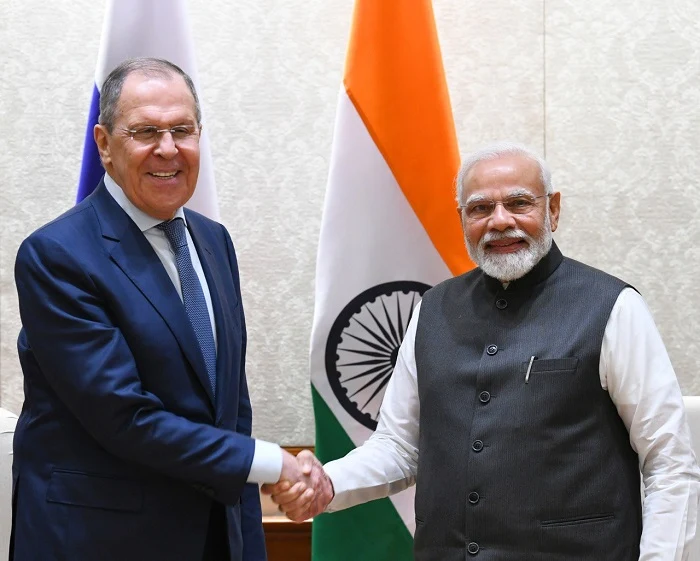Prime Minister Narendra Modi on Friday offered to "contribute in any way" to end conflict between Ukraine and Russia after Moscow praised New Delhi for adopting a "balanced position" on the ongoing tensions between the two neighbours.
This was conveyed to the Russian Foreign Minister Sergey Lavrov when he called on PM Modi in New Delhi on Friday evening before wrapping up his India visit. So far Turkey, Israel and France have stood out for offering their good offices to defuse tensions between Moscow and Kyiv.
"Foreign Minister Lavrov briefed the Prime Minister on the situation in Ukraine, including the ongoing peace negotiations. Prime Minister reiterated his call for an early cessation of violence, and conveyed India's readiness to contribute in any way to the peace efforts," the Prime Minister's Office (PMO) said in a statement after the Modi-Lavrov meeting.

The top Russian diplomat had earlier in the day, while appreciating India's non-unilateral view on the Ukraine conflict, remarked that India's foreign policy is characterized by independence and a focus on legitimate national interests – the same political basis which exists in Russia and makes the two nations good friends and partners.
Praising the "balanced position" adopted by India, Lavrov said that New Delhi "commands respect" as it is not subject to influence as a result of "blackmail and diktat" methods.
Lavrov on his part appeared to endorse PM Modi's open-ended offer of India's diplomatic intervention to ease the crisis between Russia and Ukraine
"The West ignored its obligations and created a direct military and ideological threat from Russia, indulging neo-Nazi tendencies and practices on the territory of Ukraine. If India, with its position of justice and rational approaches to solving international problems, can support such processes, I think that no one will be against it," Lavrov said after a meeting with his Indian counterpart, External Affairs Minister S Jaishankar at the Hyderabad House.
As has been extensively reported by IndiaNarrative.com over the past few months, Russia today once again highlighted the importance of increasing cooperation with its partners New Delhi and Beijing through the RIC (Russia-India-China) format in the region.
Lavrov had arrived in New Delhi on Thursday evening after holding extensive discussions with Chinese Foreign Minister Wang Yi, who had visited the Indian capital last week, on the sidelines of a conference of Foreign Ministers of Afghanistan's Neighbouring Countries beginning in China's Tunxi.
While the Russian and Chinese foreign ministries had remained mum on their foreign ministers discussing India in Tunxi, IndiaNarrative.com had reported that the duo had held discussions on the RIC format – a development which was confirmed by Lavrov today.
"In China, my colleague, Chinese Foreign Minister Wang Yi, and I discussed the further activities of the RIC association. Today, S Jaishankar and I discussed how to develop and use this troika more actively in the interests of stabilizing international relations and ensuring equality in international affairs. This is especially true given that now all three countries – Russia, India and China – are members of the UN Security Council. So we have a lot of plans," said Lavrov with EAM Jaishankar by his side.
The Russian Foreign Minister said that the troika has reflected common approaches to a number of international problems which forms the basis to take the format forward.

During the meeting, Jaishankar had also underlined that as a developing economy, global volatility in different domains is of particular concern to India and it is important for both countries that their economic, technological and people to people contacts remain stable and predictable.

Lavrov insisted that no outside pressure will affect the long-standing partnership between the two countries and it is ready to supply any goods required by New Delhi in spite of the "artificial obstacles created by the West's illegal unilateral sanctions" recently.
"With regard to the use of rubles and rupees in commercial financial transactions, I would like to recall that many years ago we began to move away from the use of Dollars and Euros in our relations with India, China and many other countries, to make more use of the national currency. Under the current circumstances, this trend will naturally increase," he said.
Lavrov's remarks appeared to reject the "riot order" read out by Daleep Singh, Washington's Deputy National Security Adviser for International Economics during his New Delhi visit earlier this week. Singh urged New Delhi not to boost Russian energy imports, and to avoid any moves that might “undermine” the US dollar, Russia Today reported.
“What we would not like to see is a rapid acceleration of India’s imports from Russia as it relates to energy or any other exports that are currently being prohibited by the US.”
He added that the United States is “very keen for all countries, especially our allies and partners, not to create mechanisms that prop up the ruble and that attempt to undermine the dollar-based financial system.”
While condemning Russia’s “needless war” on Ukraine, Singh said his visit to India was “in a spirit of friendship to explain the mechanisms of our sanctions.” But he nevertheless warned that there would be “consequences [for] countries that actively attempt to circumvent or backfill” those penalties.
Besides Ukraine, the Russian Foreign Minister also updated PM Modi and EAM Jaishankar on the progress of decisions taken during the India-Russia bilateral Summit held in December 2021 and also conveyed his assessment of the recent conference on Afghanistan in China.
Also Read: Russia's Lavrov lauds India's stance on Ukraine – rubbishes view that it is one-sided




















